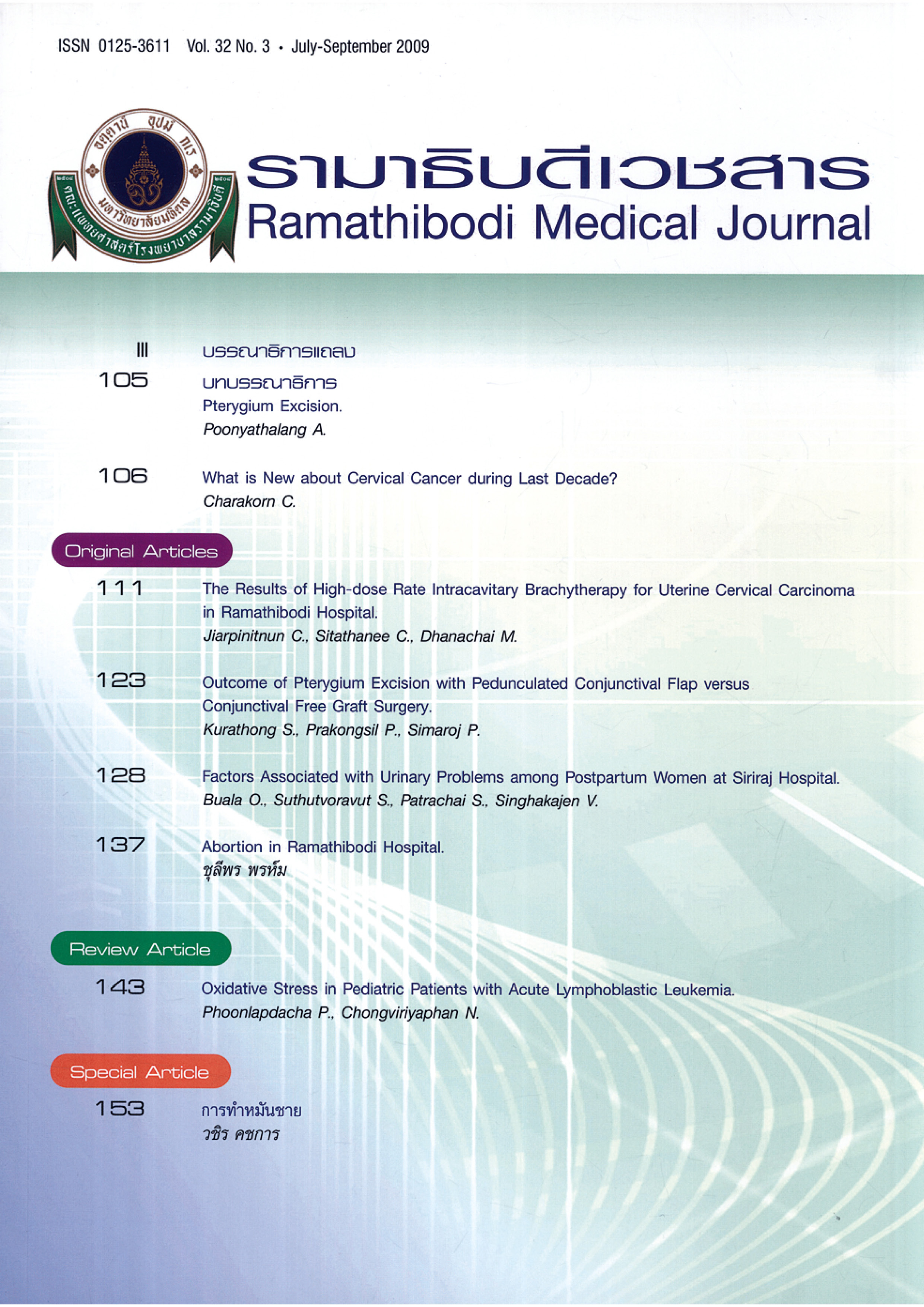Factors Associated with Urinary Problems among Postpartum Women at Siriraj Hospital
Keywords:
Urinary problems, Postpartum, Dysuria, Urinary retention, Urinary incontinenceAbstract
Background: During the postpartum period, urinary problems are common in women and may lead to chronic illness.
Objective: This study aims to determine the incidence and factors associated with urinary problems in postpartum women who delivered vaginally at Siriraj Hospital.
Material and Method: Study design was descriptive research. Data was collected by using a questionnaire to interview postpartum women within 48 hours after childbirth. During May 2008-June 2008, 198 postpartum women were recruited. Data was analyzed by descriptive statistical analysis which test the hypothesis of association between the variables, the chi-square test was used. Significance level of 0. = 0.05 was applied.
Results: The incidence of urinary problems in postpartum women in this study was 59.1%, included urinary dysuria 54.5 %, urinary retention 6.0% and urinary incontinence 3.0%. There were 9 women (4.5%) who had more than 1 problem. Factors which had significant association with urinary problems were gestational age at delivery, parity, and the duration of the first stage of labour. A factor which had a significant association with dysuria was the duration of the first stage of labour.
Conclusion: Urinary problems, especially dysuria, in postpartum women who had vaginal delivery were common. Proper care during labour would prevent these problems.
References
Cunningham FG, Leveno KJ, Bloom SL, Hauth JC, Gilstrap III L, Wenstrom KD. Williams Obstetrics. 22nd ed. McGraw-Hill, New York, 2005.
Hart DM, Norman J, Callander R, Ramsden I. Gynaecology Illustrated. 5th ed. Edinburgh: Churchill Livingstone, 2000.
Hanretty KP Ramsden I, Callander R. Obstetrics Illustrated. 6th ed. Edinburgh: Churchill Livingstone, 2003.
Gabbe SG, Niebyl JR, Simpson JL. Obstetric: Normal and problems pregnancies. 5th ed. Philadelphia, PA: Churchill Livingstone/Elsevier; 2007.
Connolly AM, Thorp JM Jr. Childbirth-related perineal trauma: clinical significance and prevention. Clin Obstet Gynecol. 1999;42(4):820-835. doi:10.1097/00003081-199912000-00009.
Sawatsuwannakun C. Factors associated with urinary problems among postpartum women at Ramathibodi Hospital [master thesis]. Bangkok: Faculty of Graduate Studies, Mahidol University; 2003. http://mulinet11.li.mahidol.ac.th/e-thesis/scan/4436382.pdf.
Carley ME, Carley JM, Vasdev G, et al. Factors that are associated with clinically overt postpartum urinary retention after vaginal delivery. Am J Obstet Gynecol. 2002;187(2):430-433. doi:10.1067/mob.2002.123609.
Pregazzi R, Sartore A, Troiano L, et al. Postpartum urinary symptoms: prevalence and risk factors. Eur J Obstet Gynecol Reprod Biol. 2002;103(2):179-182. doi:10.1016/s0301-2115(02)00045-3.
Yip SK, Hin LY, Chung TK. Effect of the duration of labor on postpartum postvoid residual bladder volume. Gynecol Obstet Invest. 1998;45(3):177-180. doi:10.1159/000009951.













